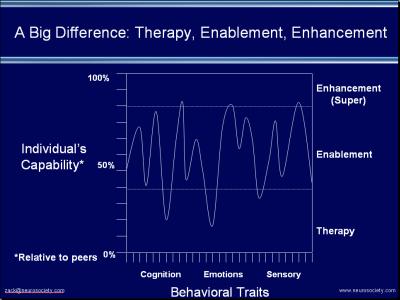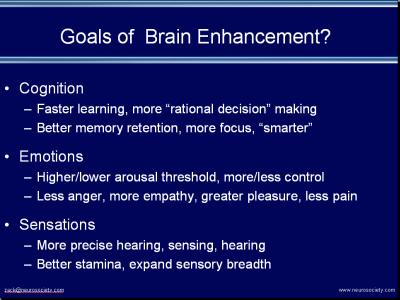Perception Shifting in Neurosociety: Ethical and Societal Implications
Zack Lynch
Page 3 of 5
Will people choose to enhance their mental performance? I would say, yes, they will. In 1921, the philosopher Ludwig Wittgenstein [1] said, “The limits of our language are the limits of our world.” I think that this is no where more true than in the ongoing therapy versus enhancement discussion.
Of course, distinguishing the line between therapy and enhancement remains a contentious and difficult project. What is normal? Clearly, every person enters the world with natural endowments that fall on some distribution of emotional, cognitive, and sensory capabilities.
Within the context of today’s terminology and neuro-technologies, people consider healthy people individuals for non-medical purposes currently defined as enhancement when we’re using these technologies for normal people.
However; this does not capture the actual intention or belief of many. This is why I’ve created the term, enablement or neuro-enablement for many of today’s emerging technologies.

Image 5: Therapy, Enablement, Enhancement
Enablement implies many things different than enhancement. It implies lifting up from the bottom, and addresses issues of fairness, and socially equality. Neuro-enablement powers people. It provides a way for people to leverage better tools for mental health to achieve their desired objective.
I think that this has applicability in particular for the neurotechnology discussion, because most of the tools in development for the brain today are not enhancements, in the sense that they do not create superhuman traits. Instead, they enable people to perform better. With that is the backdrop; what do we want from enablement, or enhancement? What are the goals of developing this technology?

Image 6: Goals of Brain Enhancement?
The first thing we need to realize is that that when speak a neuro-enhancement, they’re talking about the complex interplay of our cognitive, emotional, and sensory systems. In terms of cognition what would we like, memory consolidation [2] enhancers, tools to improve language acquisition? What would be most useful? Well, much attention is focused on, of course, cognitive enhancements with less attention paid to cognition’s sister, emotion. Here is where neurotechnology could play a whole new role in allowing individuals to live their lives unconstrained from their evolutionarily defined emotional structures.
Here, people might choose to live with less anger and more empathy. From a sensory perspective, neurotechnology could expand the sensory breadth and increase individual stamina - just to name a few.
It should be noted that even though the neuro-chemistry appears to be controlled by a reducible number of neurotransmitters and modulators, for example, the role of dopamine, and reward in plasticity, serotonin, aggression, and depression, and opioids in pain and pleasure.
These basic building blocks interact with cultural advances to give rise to an extraordinary amount of behavioral flexibility. But of course, technological possibilities alone do not drive society (as I mentioned earlier), people do.
So, will people use this technology? Yes. People are meant to pay athletes enhancers to compete and win in races; individuals choose cosmetic surgery to improve their appearance. You can bet that if there’s a way to safely improve human capital productiviity, workers will use these new tools to increase their efficiency and keep their jobs.
From a business perspective, it is clear that mental health is the ultimate competitive resource. It underpins the development of knowledge capital, and the capacity of employees to think, be creative, and be productive.
Footnotes
1. Ludwig Josef Johann Wittgenstein (April 26, 1889–April 29,1951) was an Austrian philosopher who contributed several ground-breaking ideas to philosophy, primarily in the foundations of logic, the philosophy of mathematics, the philosophy of language, and the philosophy of mind. His influence has been wide-ranging, placing him among the most significant philosophers of the 20th century.
http://en.wikipedia.org/wiki/Ludwig_Wittgenstein April 25, 2007 1:28PM EST
2. Memory Consolidation Theory - The hypothesis that new memories consolidate slowly over time was proposed 100 years ago, and continues to guide memory research. In modern consolidation theory, it is assumed that new memories are initially 'labile' and sensitive to disruption before undergoing a series of processes (e.g., glutamate release, protein synthesis, neural growth and rearrangement) that render the memory representations progressively more stable. It is these processes that are generally referred to as “consolidation”.
www.memory-key.com/NatureofMemory/consolidation.htm April 25, 2007 1:37PM EST